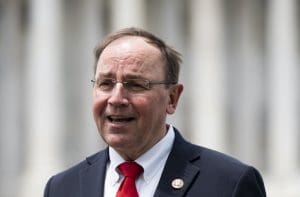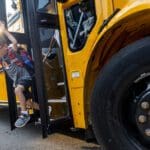Experts slam Republican bill to strip funds from schools unless they reopen
‘It is outrageous to threaten schools to open no matter what in the middle of a pandemic,’ said Rep. Andy Levin.

Two House Republicans introduced a bill on Thursday that threatens to withhold federal funding from any schools that do not reopen this fall.
The legislation was met with immediate pushback.
“First and most fundamentally, it is outrageous to threaten schools to open no matter what in the middle of a pandemic, when tens of thousands of Americans are dying,” Rep. Andy Levin (D-MI), vice chair of the House Education and Labor Committee, said in an email on Thursday.
Levin added, “Republicans have yet to offer any real support to create a safe environment for students or educators.”
The “Reopen Our Schools Act,” introduced by Reps. Jim Banks of Indiana and Tom Tiffany of Wisconsin, would prohibit 2020 federal funds from going to any school — from elementary schools through colleges and universities — that did not reopen for in-person learning by Sept. 8, according to a press release from Banks’ office.
“We need to change the subject from ‘our schools might not reopen in the fall’ to ‘our schools will reopen in the fall and here’s what we need to do it,'” Banks said.
The text of the bill was not available as of Friday morning, and the press release did not indicate that the legislation would provide any funding to help schools reopen safely. It did note that the secretary of education can create a waiver process for schools, but no additional details were provided.
Education experts expressed deep concern about the bill.
“Schools have to assess the level of safety not only for the students, but for the people who work within the school building,” RiShawn Biddle, a former education editorial writer at the Indianapolis Star and currently the editor of the website Dropout Nation, said in a phone interview on Friday morning. He was worried about teachers, aides, custodians, and others who may be at high risk for infection.
Biddle noted that in many cases, a large proportion of school staff consists of black and Latino people, “part of the groups hit the hardest by this virus.”
Dr. Conor Williams, an education expert and fellow at the Century Foundation, a progressive think tank, warned against rushing kids back to school.
“Just because we botched the response doesn’t mean that here, in the middle of it, we get to just shrug and demand that schools open anyway,” Williams said during a phone interview on Thursday. “It just seems like throwing people into high-risk situations,” he said. “I don’t think it’s warranted to take those risks at all.”
The cost of reopening schools across the nation safely — following guidelines set by the Centers for Disease Control and Prevention — could range anywhere from $25 billion to $130 billion, according to the American Federation of Teachers.
Biddle noted that most school districts receive about 10% of their funding from the federal government, but that some low-income schools receive much more than that, meaning a cut in federal funds would not impact all schools in the same way.
“The reason why federal funding in education exists is really to aid low-income and minority communities,” he said. “It’s to ameliorate the impacts and legacies of segregation, Jim Crow, enslavement, all those other things that have happened, and also to address the inequities that are just a reality in this country whatever your race is.”
The number of coronavirus cases has been spiking in several states that pushed to reopen quickly, against the advice of health experts.
Since early June, 11 states have had record numbers of new cases, including Arizona, Florida, and Texas.
Arizona, for example, had 20,123 confirmed coronavirus cases on June 1 and 31,525 cases on Friday morning. The number of deaths increased from 917 to at least 1,130 during the same time period.
In addition to more cases, nine states saw a sharp spike in coronavirus-related hospitalizations following Memorial Day.
Health experts specifically warned against reopening economies too early.
“The consequences could be really serious if cities, states, or what have you, jump over those various checkpoints and prematurely open up, without having the capability of being able to respond effectively and efficiently,” Dr. Anthony Fauci, the nation’s top infectious disease expert, told a Senate panel in mid-May. “My concern is that we’ll start to see little spikes that will turn into outbreaks.”
Williams, a father of three, said, “Barring a dramatic improvement in public health conditions, we’re not sending our kids back in the fall,” adding that he and his wife “will be waiting until we’re sure the federal government is taking this seriously and responding in a way that is going to make it possible.”
Published with permission of The American Independent Foundation.
Recommended

Alaska House committee advances, expands proposal to bar trans girls from girls sports
Amended bill would add elementary, middle school and collegiate sports to limits in place for high school
By Claire Stremple, Alaska Beacon - April 16, 2024
Senate clears gallery, passes bill to arm Tennessee teachers
Covenant parents emotional in wake of vote
By Sam Stockard, Tennessee Lookout - April 10, 2024
Not if, but when: Parents of slain Parkland students urge Utah lawmakers to pass school safety bill
The parents of children killed in the 2018 Marjory Stoneman Douglas High School shooting have a stark warning for Utah lawmakers: “It’s not a matter of if, it’s a matter of when and where the next school shooting will happen.”
By Kyle Dunphey, Utah News Dispatch - February 21, 2024









































































